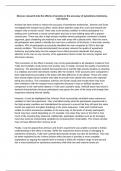Essay
Psychology 16-Marker Essay on the Effect of Anxiety on EWT
This is a 16-marker A level Psychology Essay on the prompt: 'Discuss research into the effects of anxiety on the accuracy of eyewitness testimony.' This is a subtopic within Memory in Year 1 Content and this essay refers to key studies such as Johnson and Scott and Yuille and Cutshall. This essay c...
[Show more]



